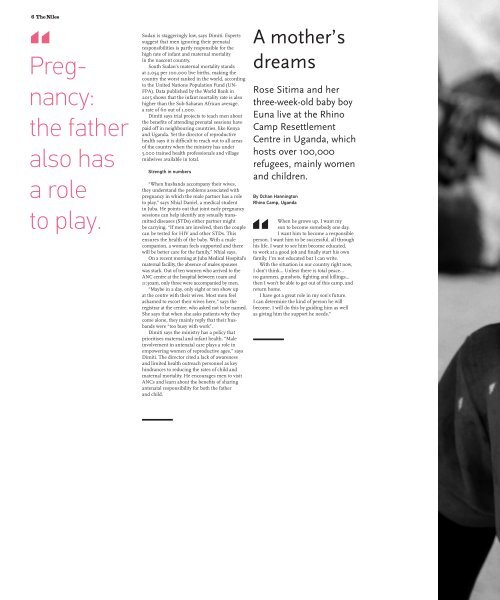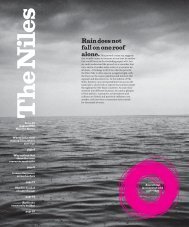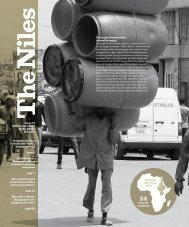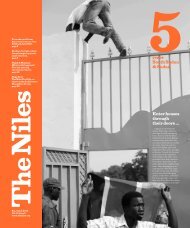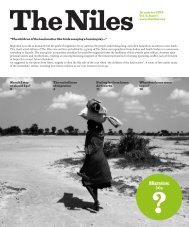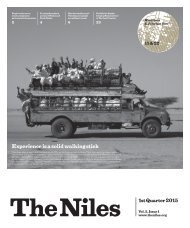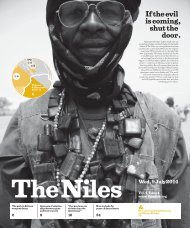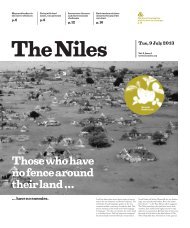Nobody has been sent to see...
Around 50 million people live in Sudan and South Sudan. They marry, they have children, they work – like the fisherwoman in this picture – they live in peace and they wage war against one another. But what awaits them in the future? Is it really as the Nuer proverb suggests, that no one knows what tomorrow brings? Some conflicts, experienced by both countries in the past years, were expected, some predictions could be drawn from past statistics. Correspondents from The Niles portrayed people from both countries through all stages of life and have briefly touched upon what it means to be Sudanese or South Sudanese.
Around 50 million people live in Sudan and South Sudan. They marry, they have children, they work – like the fisherwoman in this picture – they live in peace and they wage war against one another. But what awaits them in the future? Is it really as the Nuer proverb suggests, that no one knows what tomorrow brings? Some conflicts, experienced by both countries in the past years, were expected, some predictions could be drawn from past statistics. Correspondents from The Niles portrayed people from both countries through all stages of life and have briefly touched upon what it means to be Sudanese or South Sudanese.
You also want an ePaper? Increase the reach of your titles
YUMPU automatically turns print PDFs into web optimized ePapers that Google loves.
6 The Niles<br />
Pregnancy:<br />
the father<br />
also <strong>has</strong><br />
a role<br />
<strong>to</strong> play.<br />
Sudan is staggeringly low, says Dimiti. Experts<br />
suggest that men ignoring their prenatal<br />
responsibilities is partly responsible for the<br />
high rate of infant and maternal mortality<br />
in the nascent country.<br />
South Sudan’s maternal mortality stands<br />
at 2,054 per 100,000 live births, making the<br />
country the worst ranked in the world, according<br />
<strong>to</strong> the United Nations Population Fund (UN-<br />
FPA). Data published by the World Bank in<br />
2015 shows that the infant mortality rate is also<br />
higher than the Sub-Saharan African average,<br />
a rate of 60 out of 1,000.<br />
Dimiti says trial projects <strong>to</strong> teach men about<br />
the benefits of attending prenatal sessions have<br />
paid off in neighbouring countries, like Kenya<br />
and Uganda. Yet the direc<strong>to</strong>r of reproductive<br />
health says it is difficult <strong>to</strong> reach out <strong>to</strong> all areas<br />
of the country when the ministry <strong>has</strong> under<br />
5,000 trained health professionals and village<br />
midwives available in <strong>to</strong>tal.<br />
Strength in numbers<br />
“When husbands accompany their wives,<br />
they understand the problems associated with<br />
pregnancy in which the male partner <strong>has</strong> a role<br />
<strong>to</strong> play,” says Nhial Daniel, a medical student<br />
in Juba. He points out that joint early pregnancy<br />
sessions can help identify any sexually transmitted<br />
diseases (STDs) either partner might<br />
be carrying. “If men are involved, then the couple<br />
can be tested for HIV and other STDs. This<br />
ensures the health of the baby. With a male<br />
companion, a woman feels supported and there<br />
will be better care for the family,” Nhial says.<br />
On a recent morning at Juba Medical Hospital’s<br />
maternal facility, the absence of males spouses<br />
was stark. Out of ten women who arrived <strong>to</strong> the<br />
ANC centre at the hospital between 10am and<br />
11:30am, only three were accompanied by men.<br />
“Maybe in a day, only eight or ten show up<br />
at the centre with their wives. Most men feel<br />
ashamed <strong>to</strong> escort their wives here,” says the<br />
registrar at the centre, who asked not <strong>to</strong> be named.<br />
She says that when she asks patients why they<br />
come alone, they mainly reply that their husbands<br />
were “<strong>to</strong>o busy with work”.<br />
Dimiti says the ministry <strong>has</strong> a policy that<br />
prioritises maternal and infant health. “Male<br />
involvement in antenatal care plays a role in<br />
empowering women of reproductive ages,” says<br />
Dimiti. The direc<strong>to</strong>r cited a lack of awareness<br />
and limited health outreach personnel as key<br />
hindrances <strong>to</strong> reducing the rates of child and<br />
maternal mortality. He encourages men <strong>to</strong> visit<br />
ANCs and learn about the benefits of sharing<br />
antenatal responsibility for both the father<br />
and child.<br />
A mother’s<br />
dreams<br />
Rose Sitima and her<br />
three-week-old baby boy<br />
Euna live at the Rhino<br />
Camp Resettlement<br />
Centre in Uganda, which<br />
hosts over 100,000<br />
refugees, mainly women<br />
and children.<br />
By Ochan Hanning<strong>to</strong>n<br />
Rhino Camp, Uganda<br />
When he grows up, I want my<br />
son <strong>to</strong> become somebody one day.<br />
I want him <strong>to</strong> become a responsible<br />
person. I want him <strong>to</strong> be successful, all through<br />
his life. I want <strong>to</strong> <strong>see</strong> him become educated,<br />
<strong>to</strong> work at a good job and finally start his own<br />
family. I’m not educated but I can write.<br />
With the situation in our country right now,<br />
I don’t think… Unless there is <strong>to</strong>tal peace…<br />
no gunmen, gunshots, fighting and killings…<br />
then I won’t be able <strong>to</strong> get out of this camp, and<br />
return home.<br />
I have got a great role in my son’s future.<br />
I can determine the kind of person he will<br />
become. I will do this by guiding him as well<br />
as giving him the support he needs.”<br />
tn9_20161207_cc2014.indd 6 2016/12/7 11:29


